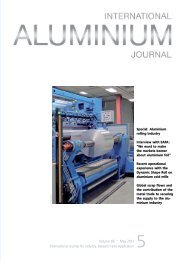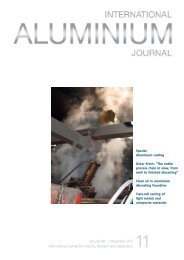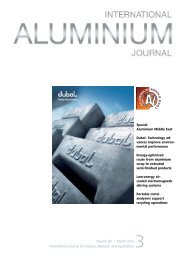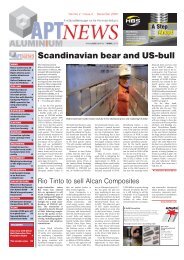special - Alu-web.de
special - Alu-web.de
special - Alu-web.de
You also want an ePaper? Increase the reach of your titles
YUMPU automatically turns print PDFs into web optimized ePapers that Google loves.
What can be done?<br />
The main problem is the distorted perception of<br />
the actual aggregate <strong>de</strong>mand of the individual<br />
stages of the value chain. The momentum of the<br />
value chain, which is influenced by systemic<br />
feedback not directly linked to the actual aggregate<br />
<strong>de</strong>mand, dominates more and more the further<br />
one gets from the end market. Three major,<br />
interrelated approaches to supply-chain management<br />
are necessary:<br />
• Firstly, a shortening of the value chain by means<br />
of integration using an exchange of information<br />
and a reduction in the throughput time using lean<br />
techniques. In general, the lean approach, which<br />
means eliminating every possible source of wastage,<br />
will become even more important in future.<br />
The result will be a smaller amplitu<strong>de</strong> with faster<br />
reaction time.<br />
• Secondly, the reduced amplitu<strong>de</strong> will allow<br />
better planning of the necessary production capacity,<br />
which is based on the real aggregate <strong>de</strong>mand.<br />
This will not eliminate the expansion of<br />
overcapacities but it will at least reduce it.<br />
• Thirdly, taking all value chains into account<br />
with which one is in competition, instead of only<br />
one’s own stage. This applies to existing capacities<br />
as well as to planned extensions.<br />
In addition, real-economy planning is necessary<br />
in or<strong>de</strong>r to avoid the serious socio-economic<br />
consequences that we are currently experiencing.<br />
Now this is consistent with the i<strong>de</strong>al world<br />
we know from theoretical books. In practice, this<br />
means that the mo<strong>de</strong>lling of scenarios should not<br />
remain an aca<strong>de</strong>mic exercise and supervisory<br />
boards should insist on planning based facts;<br />
some sharehol<strong>de</strong>rs (true company owners with<br />
social responsibility) and the employees will be<br />
grateful. The other sharehol<strong>de</strong>rs (pure speculators)<br />
on the other hand will probably view the current<br />
crisis more as an opportunity to again get<br />
involved in the stock exchange in a big way. New<br />
opportunity for the one and possible unemployment<br />
for the other, who can actually do nothing<br />
for the mistakes of managers.<br />
Authors<br />
Bruno G. Rüttimann, Dr. Ing. MBA, studied at the Polytechnic<br />
Institute in Milan and the Bocconi School of<br />
Economics. As a Master Black Belt in Lean Six Sigma<br />
he is introducing Continuous Improvement techniques<br />
at Alcan Engineered Products. He is the author of Mo<strong>de</strong>ling<br />
Economic Globalization, Monsenstein & Vannerdat,<br />
2006.<br />
Urs P. Fischer, lic. rer. pol, studied Economics at the<br />
University of Bern. He worked for many years in various<br />
financial positions and as business unit presi<strong>de</strong>nt at<br />
Alcan/<strong>Alu</strong>suisse and is now an advisor to the managements<br />
of international groups. He is the owner of the<br />
management consultancy firm Lean Solution.<br />
ALUMINIUM · 9/2009<br />
��������<br />
������������������<br />
�������������������������<br />
�������������������������<br />
���������������������<br />
e c o n o m i c s<br />
������������������<br />
�� �����������������������<br />
�������������������������������������������������������<br />
��������������������������������������������������������<br />
����������������������������������������������������<br />
���������������������������������������������������<br />
��������������������������������������������������<br />
�������������������������������������������������������<br />
�������������������������������������������������<br />
�������������������������������<br />
������������������������������������������<br />
���������
















